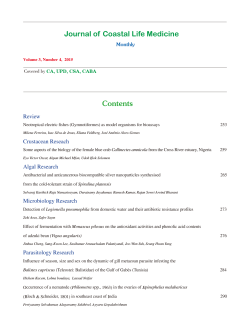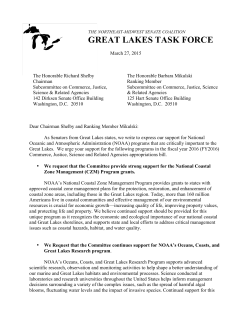
Funding Research Guidance - Great Lakes Coastal Resilience
Region 3 Coastal Program Guidance: Funding Research Background and Purpose: The Coastal Program’s core purpose is on on-the-ground protection and restoration of coastal resources. Although the Coastal Program is considered a conservation delivery program and not a research oriented program, there is key research that may be critical to strategically deploying restoration efforts in the Great Lakes. The purpose of this guidance is to assist biologists, leadership, and other staff engaged in Coastal Program activities when developing or considering research projects for funding. Research Project Expectations: Supported by and relevant to other FWS programs o Relevant FWS program or office is aware of, was engaged in developing and recommends funding the project. For example, a bird related project is coordinated with Ecological Services or Migratory Birds, a fish related project is coordinated with relevant Fisheries offices, etc. o Matching funds from other FWS programs is desirable and would indicate support. o Documents direct utility and application in the near term to on-the-ground conservation actions. Match is at least 1:1 o This demonstrates that partners expect the project will yield valuable results and demonstrates commitment to the project. Provide strong catalyst for future on-the-ground restoration o Results from research must have direct application to our core purpose. Funding amount should not exceed 20% of total 1124 project budget o This ensures we continue to focus our finite resources on our core purpose of habitat restoration. o If project is part of a larger multi-year effort, research should be scale-able or completed in phases. Scaled down projects must still provide meaningful information. High likelihood of success with one Coastal Program funding award o Coastal Program cannot make commitments for funding in future years. Justifies why Coastal Program funding is necessary o Funding should be sought from other internal FWS and external sources that are dedicated to research. For example, LCCs, USGS, Great Lakes Fisheries Trust, or others.
© Copyright 2025





















